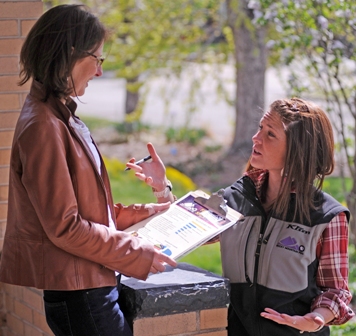Nice Above Fold - Page 484
Winning members at their doors
One of the most promising new membership initiatives to come along for public television in years doesn’t involve phone banks, on-air pitches or premium packages. It’s door-to-door canvassing, the grass-rootsy technique for talking up causes and soliciting donations face-to-face.PRX's Public Media Accelerator renamed Matter Ventures, relaunched with partner KQED
KQED in San Francisco, Public Radio Exchange (PRX) and the Knight Foundation today announced a $2.5 million media entrepreneur initiative, Matter Ventures. Project spokesman Jason Gordon confirmed to Current that Matter Ventures is the new name for the Public Media Accelerator (PMX), announced earlier this year (Current, March 12). “Matter captures the mission of this accelerator in a more powerful way than PMX,” Gordon said. “The accelerator aims to create new media ventures that do in fact matter and that can create a positive, meaningful impact on society.” The four-month accelerator program is designed to assist media start-ups with early-stage prototypes such as participatory platforms, mobile applications, B2B media services and content production engines.FCC will allow low-power FMs in urban markets, accept applications in October 2013
The FCC adopted new rules today regarding low-power FM stations, paving the way to accept a wave of applications for new LPFMs in October 2013. Under the rules, the FCC will allow LPFMs on second-adjacent frequencies to full-power FM stations if the low-power applicant provides evidence that the new station will not cause interference. These second-adjacency waivers will allow for more low-power stations in big cities where the FM band is more crowded. Other provisions of the Report and Order adopted today include: A modified point system that will give an edge to Native applicants and to LPFMs with a staffed main studio and local programming; Permission of cross-ownership of an LPFM station and up to two translator stations; And an allowance for tribal nations to operate more than one LPFM.
FCC extends comment and reply deadlines for spectrum auction issues
The FCC announced on Thursday that it has extended its deadline for comments on upcoming broadcast spectrum auctions. The original deadlines, Dec. 21 for comments and Feb. 19, 2013, for replies, are now set at Jan. 25 and March 26, 2013. The National Association of Broadcasters and CITA — The Wireless Association both requested the extension, which the FCC decided “is warranted to provide commenters with sufficient time to prepare comments and reply comments that fully respond to the complex economic, engineering, and policy issues raised” in its Oct. 2 Notice of Proposed Rulemaking.Former Education Department adviser joining WNET as vice president
WNET in New York City has hired Carole Wacey, a former senior policy adviser to the U.S. Department of Education, as vice president, education, effective Dec. 17. Wacey spent the past decade as executive director of MOUSE, a national nonprofit that uses educational technology to help empower underserved youth, and she will continue to serve on its board of directors. Prior to MOUSE, Wacey was director of the Interactive Media for Children program at the Markle Foundation in New York City, and before that was deputy director of the Office of Education Technology and senior policy adviser at the Department of Education during the Clinton Administration, consulting on development and implementation of national educational technology policy.California's Gold producer Huell Howser retiring
Huell Howser, the California pubcaster whose popular destination shows ran on stations throughout the state for two decades, is no longer producing new programs, reports the Los Angeles Times. Because there’s been no formal announcement, rumors have been swirling that Howser may be ill. “Huell is retiring from filming new shows or making appearances (or interviews) but the show will continue to air in reruns for awhile,” Howser’s assistant Ryan Morris told the newspaper. “We have been gradually winding down all year but Huell has decided to stop, come Dec. 31.” As for Howser’s health, Morris added: “I have heard the rumors and while Huell does not always tell me everything, he seems to be doing fine.
Wendell Garrett dies at 83; Roadshow appraiser since 1997
This item has been updated and reposted with additional information. Wendell Garrett, an appraiser on Antiques Roadshowsince 1997, died Nov. 14 at a hospice facility in Williston, Vt. He was 83. “Garrett was an important member of Antiques Roadshow’s appraisal team,” the program said in a statement, “displaying a generosity of spirit and intellect over the years to the Roadshow community and viewers. Behind the scenes at Roadshow, Garrett was considered a master and scholar — a Grand Poobah — and he will be missed by all.” Garrett had muscular dystrophy since he was 19 years old, and by his 60s walking had become difficult.Sky's the limit: KBIA-FM gets $25k grant to create newsgathering drones
Are small, nimble flying robots the next newsgathering tool for public broadcasters?Appropriations by Congress to CPB / Curve, 1969-2001
Opponents of aid to public broadcasting created plateaus in CPB spending in early 1980s and again in 1990s. But the general upward swing of this chart doesn’t mean more spending power. After adjusting for inflation, FY2000’s $300 million is worth 5 percent less than the FY90 figure of $229.4 million. Figures are rising again since failure of the zero-it-out movement: $300M for FY2000 and $340M for FY2001. CPB’s first appropriation in FY68 was just $5M, but from there the sum often rose by $10M or $20M a year. Reagan-era cutbacks halted CPB’s rise for years, starting with $35M cut in in FY 83 (to $137M).Third Clash accuser surfaces, files lawsuit demanding $75,000
A third accuser is alleging that Kevin Clash, the former puppeteer of Elmo the Muppet, had an improper sexual relationship with him while he was underage. The anonymous accuser, a Florida resident, seeks $75,000 in damages in a lawsuit filed today in U.S. District Court in Manhattan. Clash resigned Nov. 20 from Sesame Street after two men came forward with similar complaints.WBUR entering Cape Cod market with purchase of WMVY
Boston NPR news station 90.9 WBUR-FM is wading into the Cape Cod resort market and going toe-to-toe with WGBH’s network of stations with its planned purchase of 92.7 WMVY-FM on Martha’s Vineyard. WBUR is buying the Tisbury, Mass.-based station for an undisclosed amount from Housatonic, Mass.-based Aritaur Communications Inc. The sale is expected to close in early 2013 pending FCC approval. Now broadcasting an adult alternative format, WMVY, known as mvyradio, will switch to WBUR’s news format, reaching up to 60,000 listeners with a 3,000-watt signal. The market includes Cape Cod, Martha’s Vineyard, and coastal towns including New Bedford, Fall River, Falmouth and Westport.Public media recipients among new NEA grants for $23.3 million
The National Endowment for the Arts today announced recommendations for 832 grants totaling $23.3 million through Art Works, its largest funding initiative. The 13 categories include Media Arts, encompassing 47 grants to filmmakers and film festivals. Several of those organizations have ties to public media, including the Center for Asian American Media in San Francisco, under the direction of Stephen Gong, which got $40,000 toward the 31st San Francisco Asian American Film Festival; Firelight Media in New York City (Freedom Riders), $50,000 to support a mentorship and professional development program; and the National Association of Latino Independent Producers, Santa Monica, Calif.,Incoming host of Live from Lincoln Center is also frequent performer there
Actress and soprano Audra McDonald, winner of five Tony Awards and two Grammys, is the new host of Live from Lincoln Center. McDonald will appear on seven broadcasts from December 2012 through spring 2013, including the New York Philharmonic’s New Year’s Eve gala, One Singular Sensation: Celebrating Marvin Hamlisch. The WNET icon performance series has not had a regular host since opera legend Beverly Sills, who died in 2007. “Audra’s Lincoln Center roots run deep and wide,” said Elizabeth Scott, executive in charge of the series, in the announcement. “She’s performed on every major Lincoln Center stage.” McDonald earned her first Tony for her role in Lincoln Center Theater’s 1994 production of Carousel.Dust Bowl from Ken Burns scores well for PBS ratings
Filmmaker Ken Burns’ latest documentary, The Dust Bowl, more than doubled PBS’s average primetime rating during its premiere last week, according to PBS and Nielsen. For Nov. 19, the program’s household average rating was 4.3, with some 6.6 million viewers. Its conclusion the next night scored a 3.5, with around 5.2 million people watching. PBS’s nightly primetime average is around 2.1 million viewers.Former Frontline producer now president of Nat Geo TV
Brooke Runnette, who spent a year as a producer at Frontline, is the new president of National Geographic Television. Runnette worked at WGBH’s icon investigative news program from 1999 to 2000. From there she became a producer at ABC News Nightline, executive producer at TLC/Discovery Communications (Little People, Big World) and, most recently, executive producer and director of development at Discovery Channel — where she oversaw the popular “Shark Week” strand for four years. She joined National Geographic Channels as a vice president of development and special projects earlier this month. In her new role, she will oversee the production arm of National Geographic, reporting directly to John Fahey, National Geographic Society chair and c.e.o.
Featured Jobs




